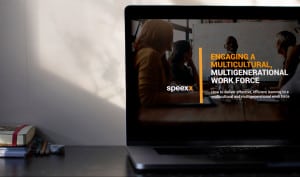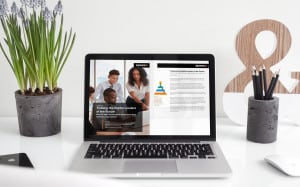On Demand Webinar:
Millennials and Gen Z – Challenges for HR and L&D
Enter this webinar and learn how to manage and overcome the challenges brought on by the new generations entering the workforce – Millennials and Gen Z. How do these generations (expect to) learn and what are some principles HR and L&D professionals could follow? Don’t miss Corina Anghel also sharing examples of meaningful and impactful learning experiences involving millennials and Gen Z!
Enter this webinar and learn how to manage and overcome the challenges brought on by the new generations entering the workforce – Millennials and Gen Z.
Enter Webinar
The Masterclass “Webinar Millennials and Gen Z – Challenges for HR and L&D” is a recorded session.

The Presenter: Corina Anghel | Sr. HR Business Partner | Avon
Corina is a Senior HR Business Partner at Avon Cosmetics, overseeing all commercial and support functions in Romania and Moldova. She is a strong learning enthusiast and an advocate of self-directed learning, trying to prove that knowing how to (really) learn is not just efficient, but extremely useful, especially in our fast-paced world of today. She’s been working in L&D within global organizations and as an external consultant. Corina enjoys speaking or writing on learning-related topics. She is also an active co-founder of Rocketists – a slow-paced business, working as an experimental lab where they develop self-directed learning methodologies and tools to support companies to become learning organizations using concepts such as growth mindset, learning habits, deliberate practice, peer learning and so on. She practices what she preaches, being a proud geek who studied Management, Psychology, and Anthropology. She holds a CIPD Certificate in L&D and enjoys reading at least 30 books every year, learning Italian and dancing ballet.

How do milennials and Gen Z challenge HR and L&D?
Both Millennials and Gen Z grew up with technology around them in their daily lives, both at home and in the classroom. These cohorts are receptive to learning and development experiences but easily become disengaged if the learning content and delivery is not personalized and relevant to them. Although organizations are aware of the tech-savviness of these generations, many are still limiting themselves to using outdated learning and development delivery tools and platforms. HR and L&D must offer relevant skills development and training that will best engage the younger generations, and in turn, help move the business forward. HR and talent managers are challenged to stay ahead of technology and ensure their learning content is truly tailored to meet the needs of their diverse work forces.
What do millennials and Gen Z expect from their first job?
Millennials want meaningful jobs that align their professional capabilities and their ethical values. They also favor social enterprises and organizations with meaningful missions and commitment to giving back to the community, doing their part to protect the environment, and companies committed to providing their workforces with positive employee experiences. This generation is looking for roles where they can do meaningful work and develop their careers. Millennials also want flexibility and do not view their careers in the same way as the generations that came before them, they demand more than just a 401k and casual Fridays. Training is key to Millennial engagement.
Gen Z is however more focused on loyalty and speed. They have a strong need to feel appreciated in the workplace and expect brands and employers to provide feedback on a regular basis. They want to advance rapidly, and most of them are also known as early-starters, meaning that they are more likely to begin their careers earlier than millennials, as soon as from 16-18 years of age.
Which generations are millennials and when does one start belonging to Gen Z?
Millennials were mainly born between 1977 – 1995, although it has been agreed that some people may belong to this cohort even if they were born four years before or after. Generation Z (also known as Post-Millennials, the iGeneration, Founders, Plurals, or the Homeland Generation) is widely considered to be made up of individuals born in the mid to late ’90, succeeding the demographic cohort consisting of millennials. Gen Z had grown up with digital technology and social media, making the way they interact and behave both in their personal, as well as professional lives, very different.
What matters most to Millennials and Gen Z when it comes to their careers?
Favored more than paid vacations and high salary packages, learning and development opportunities are the top valued job benefits in the eyes of this cohort. These generations are keen on continually learning, doing meaningful work, and steadily advancing their careers. They are eager to continue learning and develop themselves further. They also appreciate new technology, having been exposed to technology since childhood, and are typically eager to be the early adopters when it comes to new software and tools.
How do millennials learn?
Training is key to millennial engagement and this generation highly values training opportunities. Being that millennials are highly committed to developing their careers further and value opportunities for ongoing training, they also enjoy flexibility and learning at their own pace in order to maximize efficiency of time management. This group of workers likes to squeeze bits of learning time into their schedule throughout the day, perhaps while commuting or eating lunch. Allowing your employees to use their own mobile devices and set the pace for their learning, can help them to be more enthusiastic about completing their learning and training requirements. and at their own pace. They are tech-savvy and enjoy learning with the latest e-learning technology. Engage millennials through digital learning, social learning, microlearning, personalized content, gamification, and provide them with regular feedback.
How does Gen Z learn?
Unlike their predecessors, Gen Z learners value financial incentives and career advancement. They are willing to put more effort into learning when there is a monetary benefit coming out of it, or a new career opportunity. Employers need to strongly consider introducing micro-learning and self-paced learning strategies if they want to get Gen Z on board. Considering they grew up in a very fast-changing world, this generation is aware of the fact that their current hard skills might become redundant or unnecessary within the next one or two decades. This can also be a highly motivating factor when it comes to getting them to learn.
What distinguishes milennials from Generation Z?
There is still a lot of confusion when it comes to millennials and Gen Z, especially when trying to distinguish them. However, the differences are already quite clear. Having grown up with digital devices all around, fast connections to the internet and an overflow of information, this new generation can often seem like they are easily distracted, with limited attention spans and not really able to focus. At the same time, they are also able to multi-task much better than their predecessors, the millennials. Individuals born in the late ’90 have grown up in a more connected world, so they are generally more global oriented, but with an individualistic focus, characteristic that often displays in the workplace as well, where they can be perceived as not being “team-players”.
According to which values do millennials live?
This year, millennials are starting to take over the Baby Boomer generation in the workplace, so successful training and learning delivery is paramount for equipping this group with the right technical and soft skills needed to achieve business growth. Either you provide this cohort with a personalized learning experience or you could risk losing your millennial talent. Millennials value digital learning, social learning, gamification in learning, and personalized content. Aside from their learning preferences and values, they believe in flexible working models (and flexible learning opportunities – like mobile learning at their own pace) and highly value regular feedback sessions (this way they can continuously improve and stay on track with their career development). They also enjoy working on diverse teams and highly value inclusion and diversity – they want opportunities to learn from both their peers and upper management.
You might also be interested in
e-book
Engaging a Multigenerational Workforce
The modern workforce brings together Millennials, BabyBoomers and more recently, Gen Z. This e-book will help you understand the different needs of various generations and cultures within your teams. Get practical tips on how to effectively deliver learning to your workforce.
Whitepaper
Training the Digital Leaders of the Future
A lot of money may be spent on technology that either simply digitizes existing processes or, worse still, leaves customer service no better than it was before. The solution to this is simple and cost effective – grow your own digital gurus from within.

